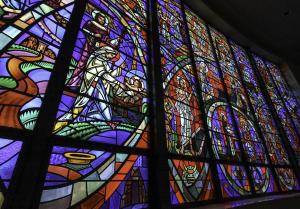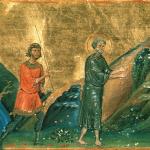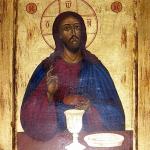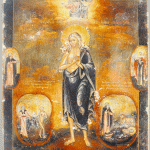
In his reflections on providence, St. Thalassios considers the depths of God’s love for us. God is for us, so who can be against us? God seeks us out, desires to lift us up from the depths of despair. God wants to liberate us from bondage, from the bondage of sin in all of its manifestations (including, of course, the structures of sin which hinder the common good).
The eschaton is immanent, the kingdom of God is within. God directs and guides creation with loving providence, a providence which seeks to bring out and fulfill his own plan for creation without denigrating or overriding creation itself “God, who gave being to all that is, at the same time united all things together in His providence.”[1] Free will is affirmed, but that does not mean God cannot and does not aid humanity in making its choices, nor help humanity when it seeks him out in order to fix the harm which it has done due to bad choices. God entices us. He shares with us graces so that we can do more than we could without him.
The eschaton is immanent, God has become man, and now heaven and earth are called to be one! “Being Master, He became a servant, and so revealed to the world the depths of His providence.”[2] God’s love leads God the Logos to not only become one of us, but to be so embracing the path of humility. That is, he came to be our servant, instead of seeking to be served. He desired to do what he could do for us, and so like a servant, he is there, waiting for us, waiting for us to ask for his help. And it is as that servant he shows us how providence comes to work for us and our salvation.
“God the Logos, in becoming incarnate while remaining unchanged, was united through His flesh with the whole of creation.” [3] God not only became one of us, but he took on a created nature through the assumption of humanity. He joined himself, not only with us, that is, with humanity, but with the whole creation. Creation is tied together not only by its common origin, but by a common nature, one which separates it from the creator. That is, every part of creation shares one common characteristic, that it is created. That is the nature which all creation shares in common: it is created. That is what unites them and allows them to be one in contrast to God who us not created.
But God became man, and gulf between God and creation is shown to be mediated by the Logos. In him, the two are one. “There is a new wonder in heaven and on earth: God is on earth and man is in heaven.” [4] Heaven and earth are one; God is not separate from his creation, but found within it, even as humanity (and with it, the rest of creation) is lifted up to heaven and finds its place in eternity. God’s plan for creation is realized, the eschaton is immanent, and truly we are called to participate in the eschaton, to realize it is already there with us and beside us even as it continues to direct us and point us to transcendence, to theosis itself.
This, then, is the plan of God, this is his purpose for creation: for it to participate in the divine life. The eschaton is that goal, and that goal is found, not as something entirely exterior to creation itself, but as something within. This means that the realization of God’s plan, the eschaton, will not be established by some sort of Deus ex machina end to history, but rather as the final and proper outcome of all that has come before it.
God has come unto his own to lift it up, to make sure all creation can participate in the divine life. “He united men and angels so as to bestow deification on all creation.” [5] We are all called to be partakers of the divine nature. This is possible because God is with us. God has become one with us, one with his creation. He is within his creation, acting out of humble love, working with his creation, giving it all it needs to realize its purpose. History is not to be ignored; matter matters. Heaven and earth go together. What happens in history is important. Gnostic rejection of the body, Gnostic denial of the immanent eschaton, holds no place in Christian theology. Those who would deny the immanent eschaton would deny providence and its grace, for how can there be either in time or space, if the eschaton, if God’s plan is not realized within?
The kingdom of God is within. The eschaton is immanent. Providence guides and directs us without turning us into mere puppets. God does this through the incarnation. God the Son, God the Logos, emptied himself of all such control so that we can be free to act and react with him and his providence as we wish. It is an act of love which had him create us, and it is an act of love which allowed him to make room for us and our freedom, even as it is an act of love which has God become man and reveal himself to us in the midst of history, in the midst of material creation. God has become man, God has taken on creation and entered it. What God has joined together – let no one separate or divide!
[1] St. Thalassios, “On Love, Self-Control and Life in Accordance with the Intellect,” in The Philokalia: The Complete Text. Volume Two. Trans. G.E.H. Palmer, Philip Sherrard, Kallistos Ware et. al. (London: Faber and Faber, 1990),312 [First Century, #95].
[2] St. Thalassios, “On Love, Self-Control and Life in Accordance with the Intellect,” 312 [First Century, #96].
[3] St. Thalassios, “On Love, Self-Control and Life in Accordance with the Intellect,” 312 [First Century, #97].
[4] St. Thalassios, “On Love, Self-Control and Life in Accordance with the Intellect,” 312 [First Century, #98].
[5] St. Thalassios, “On Love, Self-Control and Life in Accordance with the Intellect,”,312 [First Century, #99].
Stay in touch! Like A Little Bit of Nothing on Facebook.
If you liked what you read, please consider sharing it with your friends and family!













